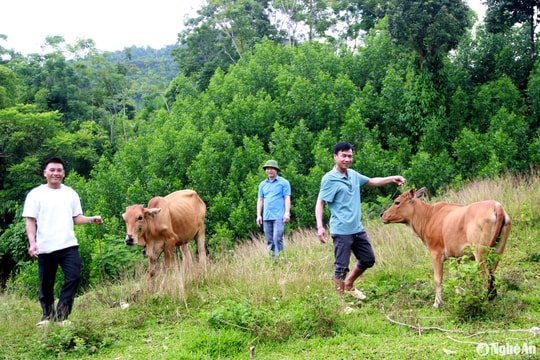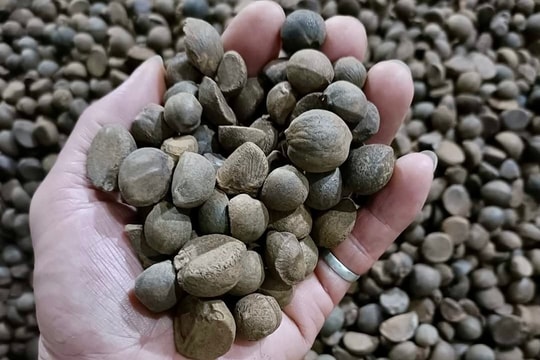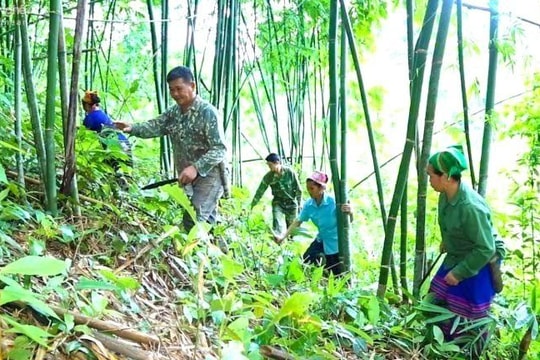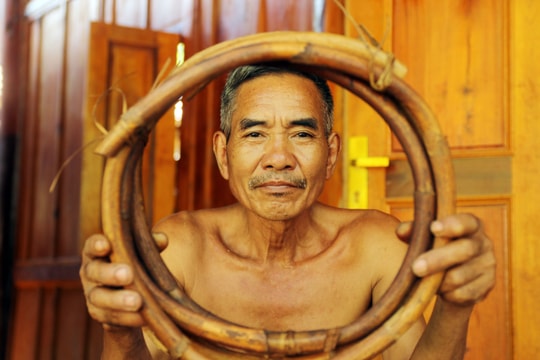The story of striving to escape poverty in the mountainous commune of Chau Kim
No longer having the mindset of “eating quickly, doing quickly”, many ethnic minority households in Chau Kim commune (Que Phong district) have made efforts to develop the economy and voluntarily left poverty. To create changes in the “way of thinking and doing” of the people, in addition to propaganda work, the Party Committee and the government have determined a direction suitable to the potential and strengths of the locality, focusing on seedlings and indigenous products associated with community tourism, ecology, spirituality, etc.
.jpg)
Focus on developing local products
The first impression when we arrived at Chau Kim commune was the green rice fields stretching as far as the eye could see.
Accompanying us, the Chairman of the Farmers' Association of Chau Kim Commune - Luong Thi Biet said: People mainly focus on growing high-quality Japonica rice and Khau Cay Noi sticky rice (Chicken Sticky Rice) which is a traditional sticky rice variety of the Thai ethnic group in Que Phong. The highlight of this rice variety is that the grains are round, large, when cooked, sticky, rich in flavor, and delicious.
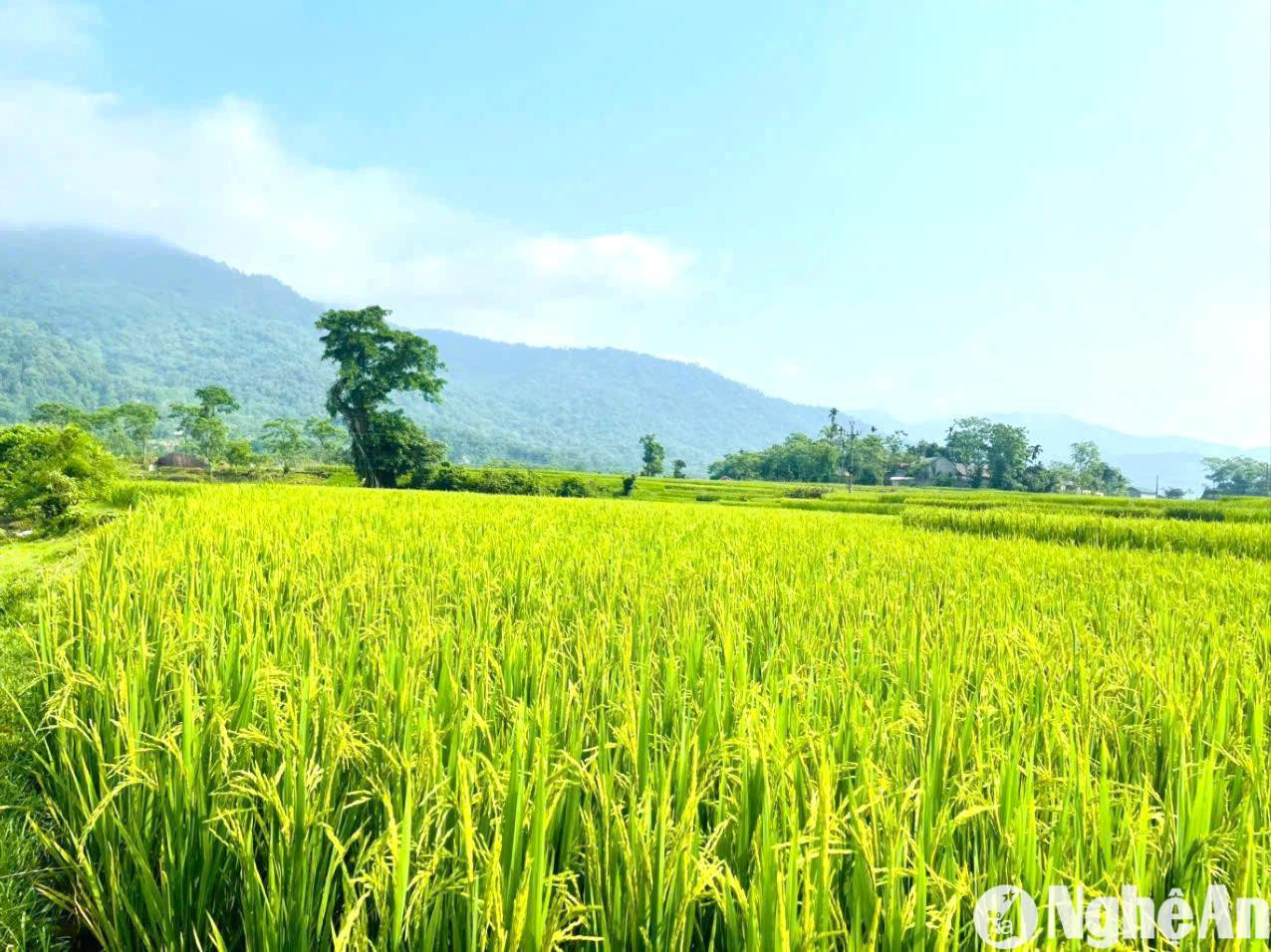
Currently, all 6/6 villages in Chau Kim commune cultivate these two types of rice. Typically, Lien Phuong village has an area of 50 hectares of rice land, growing Japonica rice in the spring crop and Khau Cay Noi sticky rice in the summer crop, each crop yields 310 tons of rice, with a yield of 62 quintals/ha.
In Do village, focusing on producing high-quality Japonica rice and Khau Cay Noi sticky rice also brings good income to many households. All production is purchased, helping agricultural workers to be more attached to agriculture.
.jpg)
Secretary of the Do Luong village Party cell, Tien Duy, happily said: The village has 23 hectares of land for producing good quality rice, with a yield of 53 quintals/hectare. Currently, the commercial price of Khau Cay Noi sticky rice is 250,000 VND/yen (sticky rice 120-150,000 VND/yen), Japonica rice is sold for 200,000 VND/yen (rice 100,000 VND/yen).
According to Mr. Ha Minh Tuan - Secretary of Chau Kim Commune Party Committee: The locality is endowed by nature with a large flat land area, plus the soft and winding Nam Giai River flowing through, making the fields always lush.
.jpg)
Therefore, the Party Committee and the government have implemented solutions to maximize the agricultural area to develop high-yield, high-quality intensive rice cultivation areas; at the same time, focusing on renovating the fields associated with organizing the conversion of economically effective crop structures to increase income value per unit area, with an average annual rice yield of 54 - 56.25 quintals/ha.
In addition to Japonica rice grown in all 6 villages in the spring crop, the commune advocates growing Khau Cay Noi sticky rice in the summer-autumn crop, striving to build a brand for Muong Ton sticky rice (the old name of Chau Kim). In particular, the whole commune has expanded the area of commercial Khau Cay Noi sticky rice from 37 hectares in 2023 to 70 hectares in the 2024 summer-autumn crop, becoming the leading locality in the district in terms of Khau Cay Noi sticky rice area.
.jpg)
In addition to high-quality rice, Chau Kim also directed the Commune Mass Mobilization Block to propagate and mobilize people to do a good job of forest protection, new planting, and protection of forest products (forest coverage reached 78.9%); Directed the Commune People's Committee to coordinate with the consulting unit to complete the dossier to submit to the superiors for land allocation, linking forest allocation to 419 households and individuals; at the same time, build models for developing medicinal plants under the forest canopy (cardamom, mu tun, 1-flower seven-leaf ginseng...), especially preserving yellow flower tea with an area of 97 hectares and planting 17 hectares of new land concentrated in Co Muong village and Huu Van village.
.jpg)
Up to now, the political system of Chau Kim commune has deployed 30 "Skilled Mass Mobilization" models in all fields, including 13 economic models. Typical examples include the model of growing vegetables in Do, Khoang Do, and Co Muong villages; the model of preserving and developing Que Quy trees in Co Muong village with a total area of 5 hectares; the model of renovating mixed gardens and planting fruit trees with 2.9 hectares in Co Muong and Huu Van villages; the goat raising occupational complex in Huu Van village...
Currently, the whole commune has 3 farms with an average income of 100 - 120 million VND/year; there are 16 large and small farms mainly raising buffalo, cows, chickens and growing acacia, cinnamon trees... Income from households each year is 50 - 60 million VND/year.
.jpg)
At the same time, taking advantage of the locality having Chin Gian Temple - a historical and cultural relic with a long history associated with the formation of Muong villages of the Thai people, which has been ranked as a National Monument by the Ministry of Culture, Sports and Tourism; with a terrain of many rapids; a culture with many identities, with a long-standing traditional craft of weaving and brocade weaving... Chau Kim commune has issued and implemented a plan to develop eco-tourism and community tourism associated with preserving and promoting ethnic cultural values in the commune for the period 2021 - 2025, with a vision to 2030.
.png)
The highlight is to build and put into operation quite effectively a community tourism model in Co Muong village according to the support policy of Resolution 07/2021/NQ of the Provincial People's Council. Thereby, creating a livelihood model and leverage for people to rise up and escape poverty sustainably...
People voluntarily ask to escape poverty
Thanks to the propaganda and mobilization work that goes one step ahead, combined with the exemplary role of cadres and party members in "eliminating the mentality of waiting and relying on others", eliminating hunger and reducing poverty in residential areas, the people of Chau Kim commune are increasingly self-conscious, making efforts to overcome difficulties and escape poverty.
In February 2023, for the first time, Que Phong district organized a conference to honor households with great efforts in socio-economic development and poverty alleviation. Notably, of the 34 outstanding households honored at this conference, there were 30 Thai ethnic households in Chau Kim commune.
.jpg)
Mr. Luong Van Truong (70 years old) in Co Muong village, Chau Kim commune - the person honored to be chosen to speak at the conference shared: The reason I wrote the application to be removed from the poor household list is simply because in the past my family had enjoyed the support policies and regimes of the Party, the State, and the locality for poor households. Now, thanks to investing in planting 7 hectares of forest, developing herds of buffalo and cows, working hard in the fields... the economy has become more stable, so my family has decided to be self-reliant and leave it to others who are in more difficult circumstances."
.jpg)
According to the leaders of Chau Kim commune, by the end of 2023, the whole commune had 40 households applying to leave poverty with the desire to escape from dependence and rise up on their own. A typical example is the family of Mr. Vi Van Tuyen (born in 1957) in Khoang Do village, who was previously in difficult circumstances, but thanks to hard work and having his first son working abroad, he proactively applied to escape poverty with the reason "due to his efforts to rise up, he has the ability to escape poverty".
Some households started out in difficult circumstances but have now become well-off and wealthy. A typical example is Mr. Vi Kim Sinh's household in Co Muong village with 3 hectares of fruit trees and timber trees such as lat, acacia, cinnamon; combined with 2 fish farms, raising buffaloes and cows for breeding, each year brings in an income of 90 million VND. The garden, pond, barn, forest model... of Mr. Kim Van Dung's family in Huu Van village brings in an average annual income of 200-300 million VND.
.jpg)
The happiest thing is that some village and hamlet officials have accompanied the people in hunger eradication and poverty reduction, such as Ms. Ha Thi Phuong Lan - Head of the Co Muong village working committee, who has mobilized 10 households in the village to convert to growing peanuts and corn on abandoned fields, harvesting 2 crops per year, yielding 4-5 quintals/crop and is currently experimenting with growing Cham Nieu sticky rice with positive results.
Or Mr. Lo Van So - Secretary of the Party Cell of Co Muong village is one of the three pioneering households to open homestays to develop community tourism in Co Muong village... contributing to job creation and increasing income for local workers.
.png)
Although there are still difficulties, the proactive efforts to enrich themselves legitimately on their homeland or the voluntary application to be removed from the list of poor households by the people of Chau Kim commune are a strong change in awareness, thereby creating a driving force to promote economic development, contributing to reducing the rate of poor households and building new rural areas in the area./.

